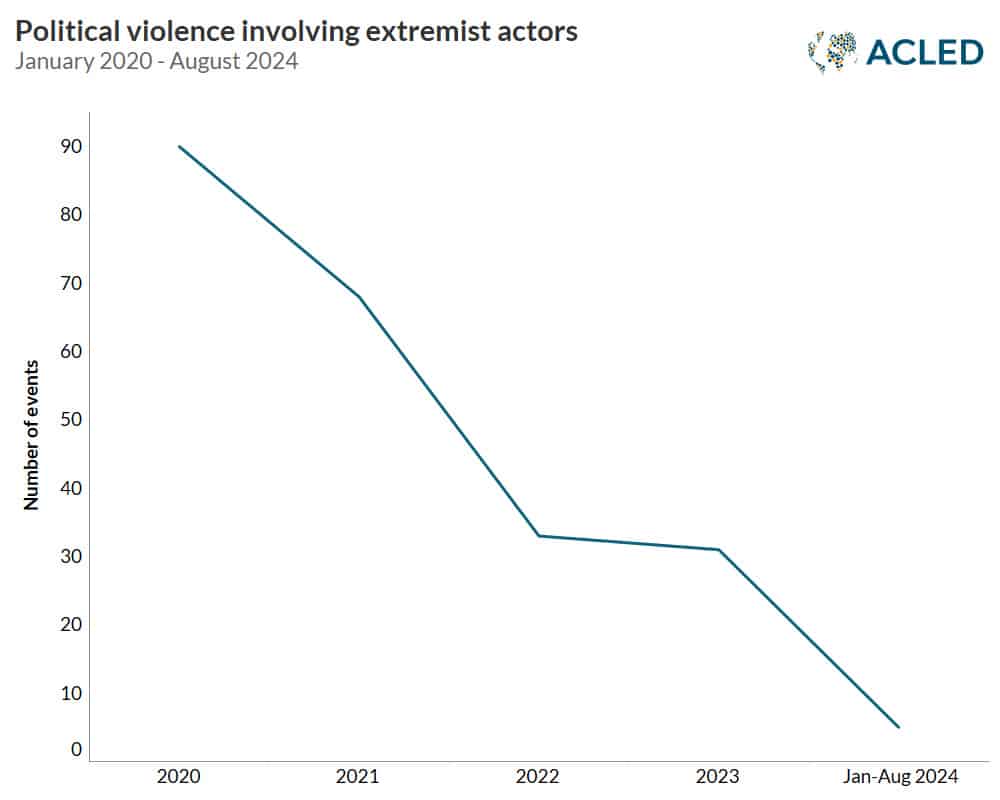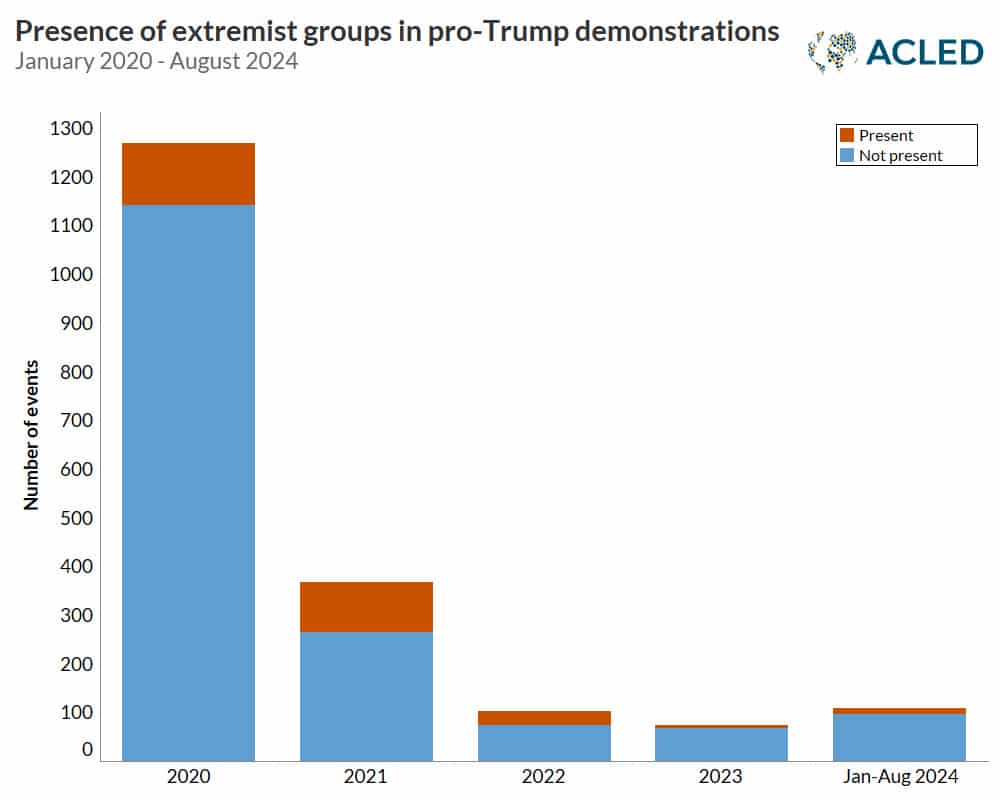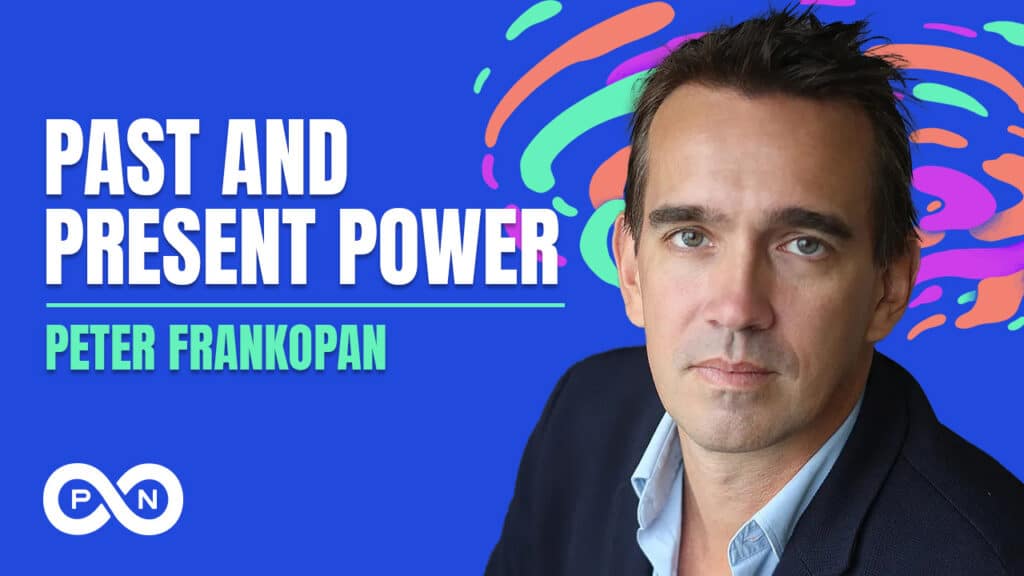Volcanoes are erupting in The Philippines, but on-fire Australia received some welcome rain. The Iran war cries have been called off and The Donald’s military powers are about to be hamstrung by the Senate. Meanwhile, his impeachment trial is starting, and we’re all on Twitter for a front-row seat.
What Could Go Right? The Election News You Aren’t Reading
Extremist groups’ activity has declined substantially since the last presidential election.
This is our weekly newsletter, What Could Go Right? Sign up here to receive it in your inbox every Thursday at 5am ET. You can read past issues here.
The Election News You Aren’t Reading
With less than one week until the American presidential election, 76 percent of registered voters are somewhat or very concerned about post-election violence aimed at overturning the results.
Stoking the flames of general election concerns—literally—are incidents of arson at ballot boxes in Washington and Oregon. Only three ballots were damaged in Oregon, but hundreds were in Washington when the fire suppression technology embedded in the box failed to operate. Election offices across the country have fortified themselves against threats with bulletproof glass, security badges and cameras, and expanded training for their workers. The Capitol Police ran a “casualty evacuation exercise” on Monday. And of course, we are only a few months past the two attempts on former President Donald Trump’s life. The landscape is turbulent.
There is one major difference between the last presidential election, after which rioters contesting its results broke into the United States Capitol, and this one, however. Extremist groups’ activity has declined substantially in the interim. According to a September report from the nonprofit Armed Conflict Location and Event Data (ACLED), which monitors armed conflict globally, 2024 is “currently on track to see the lowest single-year levels of extremist group mobilization” in the US since 2020.

With many of their high-ranking leaders incarcerated after the January 6th riot, groups central to its organization, such as the Proud Boys, Three Percenters, and Oath Keepers, are no longer able to mobilize their members on the streets. The activity of the Proud Boys in particular has cratered. And while the QAnon movement has remained active online, references to it during in-person demonstrations have “seen a precipitous falloff,” the report says. On the other end of the spectrum, anti-fascists are currently mobilizing at half the rate that they did in the lead-up to the 2020 election.
Certain white nationalist and neo-Nazi groups are defying this trend, becoming more active recently, but not in support of Trump. The report notes that these groups have taken a chilly stance toward him, perhaps disappointed by his failure to live up to their expectations.
General pro-Trump demonstrations have also eased, an indicator that “Trump’s followers may have grown less responsive to his calls to action than they were in the past.” Legal action against the former president, including his arrest in August 2023 on racketeering and conspiracy charges and his conviction in May of 2024 in the Stormy Daniels hush money trial, has rarely inspired in-person demonstrations. Even after the image of Trump pumping his fist at the site of the first assassination attempt against him in July of this year became instantly iconic, ACLED recorded less than 50 demonstrations in support of him, and only one in which an extremist group participated.

The report ends, “It is difficult to overstate how different conditions are in 2024 compared to the previous presidential election year.” There is no undertone of mass unrest as there was at that time with the Black Lives Matter and pandemic-related protests. Trump is not in office and does not hold the levers of power that he did back then. Extremist groups do not seem to have been preparing for a coming storm.
So while there is plenty of reason to expect that, if Trump loses, he will contest the results, that will not necessarily translate into the kind of extremist violence the country dealt with the last time around.
ACLED’s report is careful to say that this doesn’t mean that the risk of violence doesn’t exist. Regardless of which candidate wins or loses, the report isn’t an assumption that nothing will happen, and it does not preclude the possibility of protests, extremist groups’ involvement, or violence by such groups or by individuals. Lone actors, as shown by both of the assassination attempts against Trump and seemingly in the case of the ballot box fires as well, can cause turmoil.
But it is our mission here at The Progress Network to platform evidence that may point to an outcome other than the worst-case scenario (or an aspect of what would be a very bad scenario). This is not a prediction, but a piece of information to balance among all the information already at our disposal.
TPN-recommended reading around the election:
- US elections have become more secure over time
- They have also become more transparent
- Most election fraud claims still have very simple explanations
- Certification will be harder to stop this time around
- The swing states most crucial to the election have leaders who are committed to a fair process (The Atlantic $)
- The top ballot measures and trends to watch
What Could Go Right? S6 E27

Has western civilization fallen behind the rest of the world? Should the United States and Great Britain establish better foreign policy with the rising Global South? What can history teach us about global viewpoints? Zachary and Emma speak with Peter Frankopan, global history professor at Oxford and author of several books including his recent title, The Earth Transformed. They discuss the worldwide effects of the United States’ recent domestic focus, what to learn from India’s neutral stance on the Russia-Ukraine conflict, how Middle Eastern nations are part of a world on the move, and if the world is heading toward a new dark age. | Listen now
By the Numbers
40%: The share of girls in Africa vaccinated against HPV, compared to 21% in 2020. HPV vaccines have been shown to be remarkably successful at preventing cervical cancer if given before girls are sexually active.
20: The battery capacity, in gigawatts, installed to the US’ electric grid in four years, equivalent to the output of 20 nuclear reactors. These huge batteries prevent power blackouts.
600+: The number of mountain gorillas now in Rwanda, after the animals were driven nearly to extinction by the 1980s. The gorilla families are doing so well that they are in need of more space.
Quick Hits
🇴🇲 In a rarity for the region, Oman is laying the groundwork for a universal social security system. Its sweeping new social protection law, which will go fully into effect by 2026, introduces several measures, including a universal child benefit to every family, a disability allowance, paid sick and paternity leave, and many others.
💉 The world’s first trial for an mRNA vaccine against norovirus—the bug marked by intense vomiting and other gastrointestinal symptoms—has begun across multiple countries.
🌲 Golf courses across the US, United Kingdom, Canada, and Australia are being rewilded, turned into nature preserves or parks after being purchased by nonprofits, cities, or land trusts. Rewilding has also gained major traction in Europe, where efforts are underway to create the continent’s own “Yellowstone.”
🚁 The Federal Aviation Administration (FAA) has published final regulations for powered-lift aircraft, the first new category of aircraft since helicopters were introduced in 1940. This type of aircraft is what commercial air taxi companies will use once they obtain the necessary certificates for operation from the FAA.
🧑🚀 Researchers at the Massachusetts Institute of Technology are developing “super limbs” that extend out of an astronaut’s backpack in the event of a fall. On the moon, a partial gravity environment can mean it’s difficult to get back up again. The Artemis program will soon return American astronauts there for the first time since 1972.
⚖️ Until two weeks ago, Malaysia was one of the world’s 24 countries that ban or limit women from conferring citizenship on their children. The country’s parliament voted this month to change its constitution so that children born abroad will automatically become citizens even if the father is not Malaysian.
👁️ A late-stage clinical trial has shown promising results for partially restoring vision to patients with vision loss from age-related macular degeneration. This is achieved by implanting a prosthetic retina. No other treatment options for the condition exist.
🔋 Millions of tons of lithium have been found in southern Arkansas, more than enough to meet the world’s demand for the mineral critical for the green energy transition. It may also mean that the US can produce its own on a mass scale, rather than relying on imports.
📉 The International Monetary Fund has declared that the period of high global inflation is largely over, with surprisingly little cost to economic growth. They project that inflation will cool to 4.3 percent in 2025, and 2 percent in wealthy countries.
🏳️🌈 In many countries, after campaigns for same-sex civil marriage—for instance in Taiwan, Japan, and Czechia—acceptance of the idea, and of LGBTQ couples more broadly, is at a record high.
👀 What we’re watching: The first generation of “content kids”—children of influencers and vloggers—has grown up, and they are speaking out against the monetization of their lives on social media. So far, legislation to protect influencer children has been introduced in 11 states.
💡 Editor’s pick: Tidal stream and wave energy, two niche power sources currently in development, will never dominate the clean energy landscape. But they could play a valuable niche role. After 10 years of fits and starts, momentum is finally building toward the technologies’ commercialization.
TPN Member Originals
(Who are our Members? Get to know them.)
- A positive case for Kamala Harris | Slow Boring | Matthew Yglesias
- Endorsement: Kamala Harris | No Mercy/No Malice | Scott Galloway
- Trump’s “enemy from within” controversy | Isaac Saul | Tangle
- From Mussolini to Trump, elections are the autocrat’s enemy | Lucid | Ruth Ben-Ghiat
- The election is happening too soon | NYT ($) | David Brooks
- The G-Zero is getting worse: Why no one’s stepping up to solve today’s biggest wars | GZERO | Ian Bremmer
- Are we inching toward World War III? | Nonzero | Robert Wright
- Lebanon’s sovereignty hinges on amplifying voices that love their country | The International Correspondent | Faisal Saeed Al Mutar
- In praise of progress | The Edgy Optimist | Zachary Karabell
 Space journalist Eric Berger on SpaceX and America’s New Space Age | Faster, Please! | James Pethokoukis
Space journalist Eric Berger on SpaceX and America’s New Space Age | Faster, Please! | James Pethokoukis- Are you a Platonist or an Aristotelian? | The Atlantic ($) | Arthur C. Brooks
 The podcast with an AI producer | Life with Machines | Baratunde Thurston
The podcast with an AI producer | Life with Machines | Baratunde Thurston- Big tech transitions are slow | The Roots of Progress | Jason Crawford
- How I learned to stop criticizing everything | Persuasion | Eboo Patel


